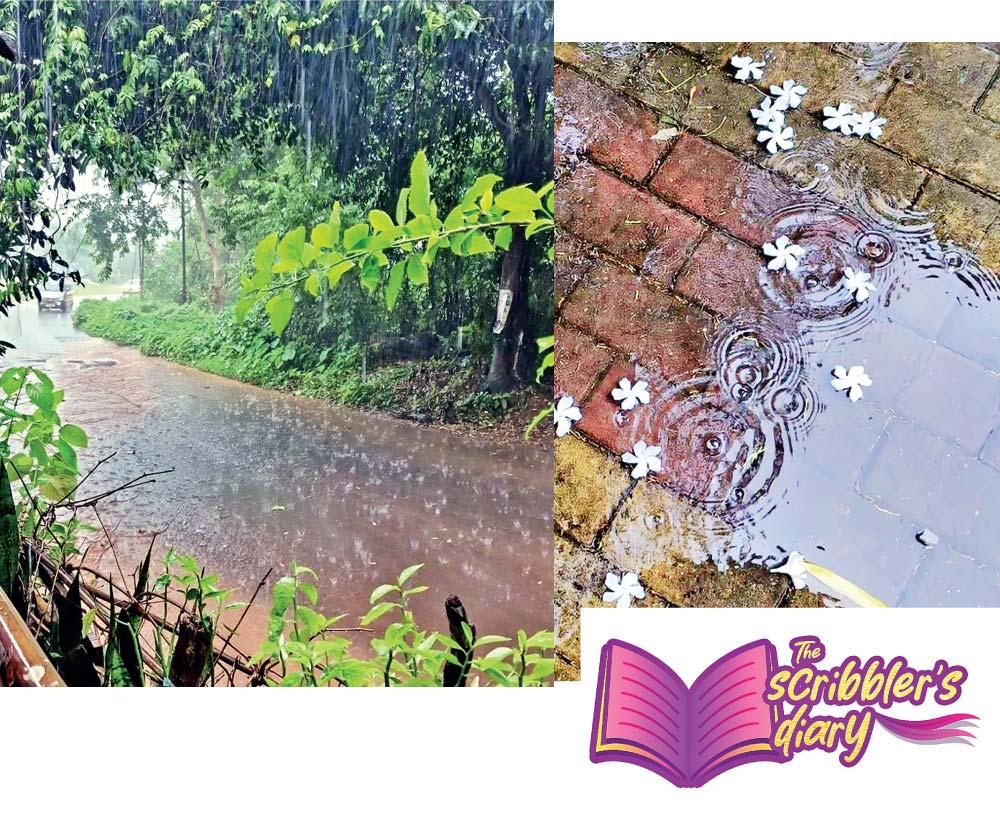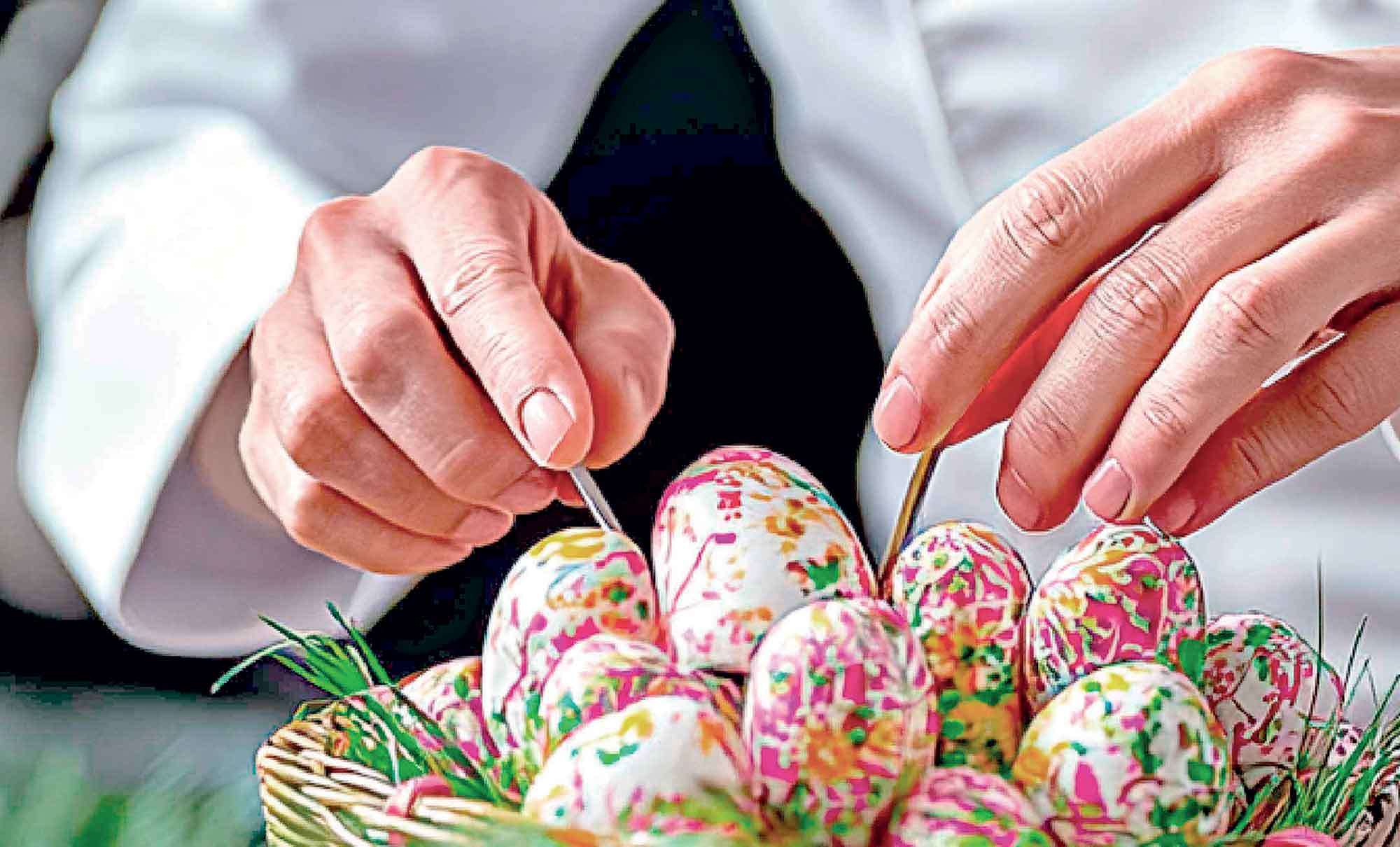

By Taleetha Wambeck
It begins with a whisper, a low murmur that stirs the mango leaves into a trembling symphony, makes the crows shuffle uneasily on their blackened perches, and sends the street dogs slinking into the shadows, their ears twitching in unease. The first raindrop falls timidly, unnoticed save by the tiniest ant scrambling with frenetic purpose back to its underground haven. But soon, the sky unravels, spilling its sorrow and joy in torrents, washing over the earth like a sudden, uncontainable confession. In a small house with peeling yellow walls, a boy crouches by the doorway, folding the last of yesterday’s newspaper into a boat. The ink smudges his fingers, leaving faint shadows like half-forgotten memories. He doesn’t care about the uneven corners or the fragility of the paper; all that matters is setting it afloat in the widening puddle outside.
His Appa stands in the yard, wielding a battered wiper against the encroaching water, the futility of his effort written in his muttered curses about clogged drains and ruined sandals. The boy’s boat tips over almost immediately, dissolving into the muddy water as if surrendering to its fate. Undeterred, he dashes inside and tears a fresh sheet of A4 paper from the printer, his wet footprints painting an abstract trail on the floor. This one, he thinks, will be better. This one will survive. The monsoon in Sri Lanka is not merely rain; it is a mosaic of memory. It smells of earth cracked open, the petrichor rising like an old song you’d forgotten you loved. It tastes of the sea’s salt, carried inland by winds that whisper stories of their long journey across the waves. And it sounds like tin roofs trembling under a ceaseless, tuneless onslaught, as if confessing secrets too ancient to decode.
 A woman leans out of her window, her fingertips brushing the wet, electric air. In her mind, she is no longer in a cramped Colombo apartment; she is a child again, barefoot in a paddy field, her soaked skirt clinging to her legs like an embrace
A woman leans out of her window, her fingertips brushing the wet, electric air. In her mind, she is no longer in a cramped Colombo apartment; she is a child again, barefoot in a paddy field, her soaked skirt clinging to her legs like an embrace
A woman leans out of her window, her fingertips brushing the wet, electric air. In her mind, she is no longer in a cramped Colombo apartment; she is a child again, barefoot in a paddy field, her soaked skirt clinging to her legs like an embrace. Her grandmother’s voice echoes faintly, shouting warnings of the rain’s temperamental cruelty. She ignores it, as she always did. Back then, rain was freedom incarnate, a tempestuous lover that kissed your skin and dared you to dance. In Pettah, the rain is a performer, and the market its stage. Vendors wrestle with tarpaulins, their movements a desperate, improvised choreography. A young man hawking pirated DVDs shouts his offers into the water, his voice slicing through the downpour with practiced urgency.
Nearby, a schoolgirl shields her books with a plastic bag held like a treasure chest, her hunched figure braving the storm with the quiet defiance of someone who knows her worth has always been questioned. When she slips on the glassy pavement, for a fleeting moment, she becomes a mirror to all of us, teetering on the edge of balance in a world that seems determined to tip us over. By the gates of Methodist College, a girl sits on the rain-slick steps, her uniform a second skin clinging to her trembling frame. It’s 4 p.m., and the rain shows no mercy. She glances at the clock above the entrance: 4:12. Time stretches thin in the waiting, a slow, unspooling thread.
The security guard, her only companion, exhales cigarette smoke into the storm. “You’re always here alone,” he says, his voice almost swallowed by the rain’s roar. She shrugs, tossing a pebble into a puddle. “Maybe it’s better this way,” she murmurs, her voice as faint as the ripples her pebble leaves behind, expanding outward, carrying her words to nowhere.
Two friends leap off the 101 bus, their laughter bright and reckless against the rain’s relentless cadence. Their schoolbags bounce against their backs as they sprint toward choir practice at St. Chapel Lane Church. One stumbles, pulling the other down with her, and they collapse in a tangled, giggling heap on the rain-slicked ground, their laughter rising like steam in the cold. In a gated community, a teenage boy with restless eyes and too much money lives at the top of a polished lane near the beach, watching the rain through pristine glass, his boredom a stark contrast to the drenched gardener outside, trimming hedges with resigned precision.
His parents are abroad, oblivious to his boredom and the storm outside. At the lane’s bottom, where the road gives way to ugly sidewalks and salty air, a girl waits with a surfboard. She shouts his name, her voice carried by the rain. He runs, feet splashing through puddles, his laughter joining hers as he lifts her into the air, her dress billowing like a sail. For a moment, the rain is not an intruder but a witness to their rebellion, painting them in watercolors of defiance and elation. In a quiet village inland, the rain slows to a contemplative rhythm, each drop deliberates as though savoring its fall. An old man sits by the window of his wooden house, his teacup trembling in his hands. Outside, his late wife’s sarong sways on the line, forgotten in the rush to bring in the laundry. It dances with the wind, a spectral memory of their shared monsoons and whispered secrets.
The boy’s second paper boat glides for a heartbeat before capsizing, its pristine whiteness swallowed by the murky water. He groans, his Appa scolding him for wasting paper. But then he spots an old calendar, its pages yellowed but thick with possibility. He tears out a sheet and folds it with careful, determined hands. Outside, the rain drums louder, as though urging him on. In Colombo’s suburbs, the rain seeps like an uninvited guest, finding every crack and weakness. A mother stares at the bucket catching water from a leaky ceiling, her hands on her hips and her thoughts elsewhere. Her toddler claps at the rhythmic 'plop plop plop' of droplets, his laughter a fragile balm against the rising tide of her worries. In a parked car on a desolate street, a couple sits in silence. The rain pelts the windshield like tiny fists, matching the tension inside. One stares out at the storm, her tears indistinguishable from the raindrops streaking the glass. The other grips the steering wheel, as if holding on to something already slipping away. The monsoon doesn’t discriminate. It drenches us all alike, though never equally. In Jaffna, the rain arrives at wells and coaxes green from the stubborn red earth.
 Nearby, a schoolgirl shields her books with a plastic bag held like a treasure chest, her hunched figure braving the storm with the quiet defiance of someone who knows her worth has always been questioned.
Nearby, a schoolgirl shields her books with a plastic bag held like a treasure chest, her hunched figure braving the storm with the quiet defiance of someone who knows her worth has always been questioned.
A young girl watches from her veranda, the rain washing the dust away like an overdue apology. She imagines Colombo, its chaos, and its rain, wilder, angrier, louder, like the city itself. By the sea, fishermen haul their boats ashore under the rain’s indifferent gaze. It blesses and curses in equal measure, filling their nets even as it churns the waves. One man pauses to wipe his brow, rain mingling with sweat. His gaze drifts to the horizon, where his son’s boat is barely visible. He prays the rain stays kind tonight. The boy’s final paper boat floats longer, its calendar-paper hull defying the storm. His Appa leans the wiper against the wall, sighing as he calls the boy inside. But the boy doesn’t hear. He watches the boat, its fragile persistence, its tiny rebellion, until it disappears into the puddle’s embrace.










